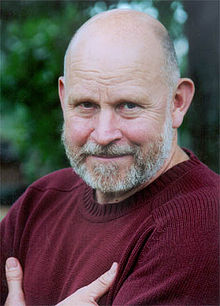Pēteris Vasks
| Pēteris Vasks | |
|---|---|

Vasks in 2007
|
|
| Background information | |
| Born | 16 April 1946 |
| Origin | Aizpute, Latvian SSR |
| Genres | Classical music |
| Occupation(s) | composer, violinist |
| Years active | 1970s– |
Pēteris Vasks (born 16 April 1946) is a Latvian composer.
Vasks was born in Aizpute, Latvia, into the family of a Baptist pastor. He trained as a violinist at the Jāzeps Vītols Latvian Academy of Music, as a double-bass player with Vitautas Sereikaan at the Lithuanian Academy of Music and Theatre, and played in several Latvian orchestras before entering the State Conservatory in Vilnius in the neighboring Lithuania to study composition with Valentin Utkin, as he was prevented from doing this in Latvia due to Soviet repressive policy toward Baptists. He started to become known outside Latvia in the 1990s, when Gidon Kremer started championing his works and now is one of the most influential and praised European contemporary composers.
Vasks' early style owed much to the aleatoric experiments of Witold Lutosławski, Krzysztof Penderecki and George Crumb. Later works included elements of Latvian folk music, such as his gentle and pastoral cor anglais concerto (1989). His works are generally extremely clear and communicative, with a solid and muscular sense of harmony. Lyrical passages may be followed by agitated dissonances, or interrupted by sombre sections with a march-like feel. He made extensive use of minimalist techniques as well, but never became attached to any particular method.
Vasks feels strongly about environmental issues, and a sense of nature both pristine and destroyed can be found in many of his works, such as the String Quartet No. 2 (1984). Other important works include Cantabile (1979) and Musica dolorosa (1984) and "Bass Trip" (2003) for solo double bass. He has written five string quartets, the fourth (2003) and fifth (2006) of which were written for the Kronos Quartet.
...
Wikipedia
